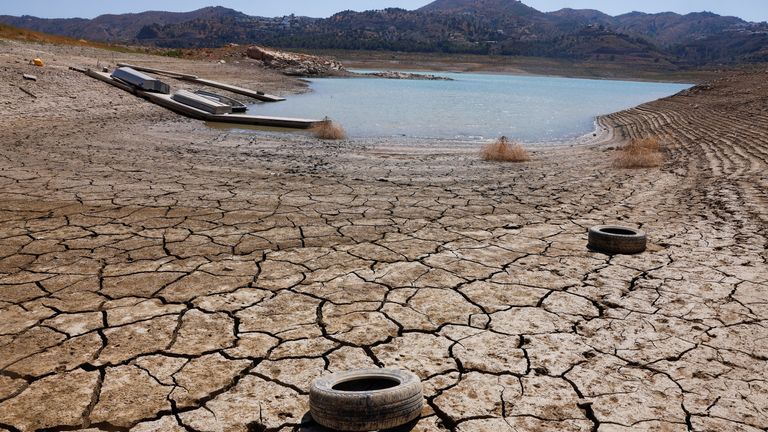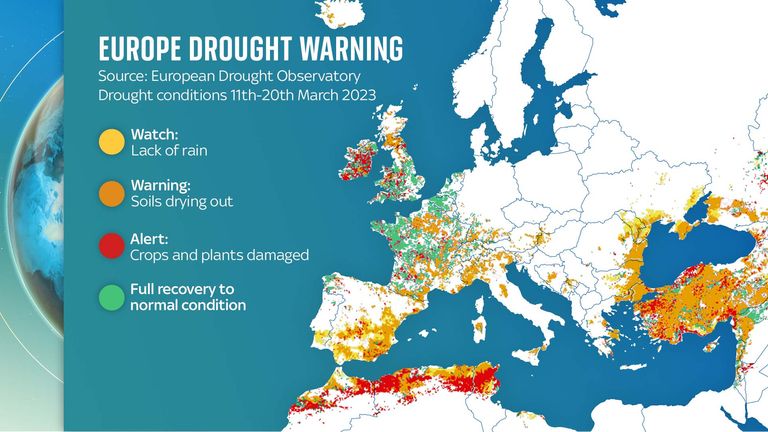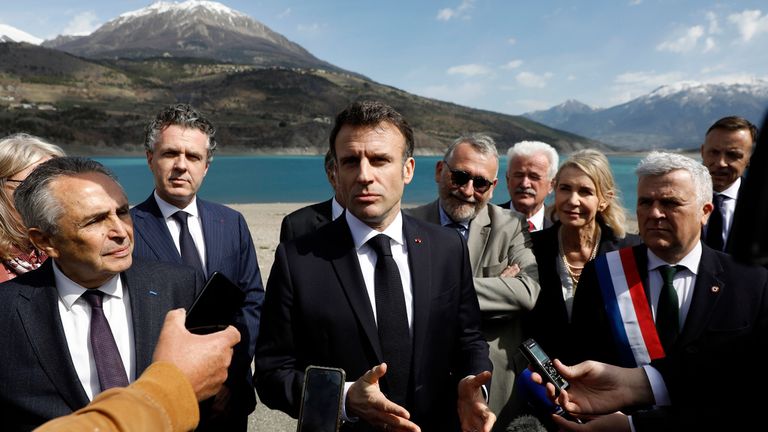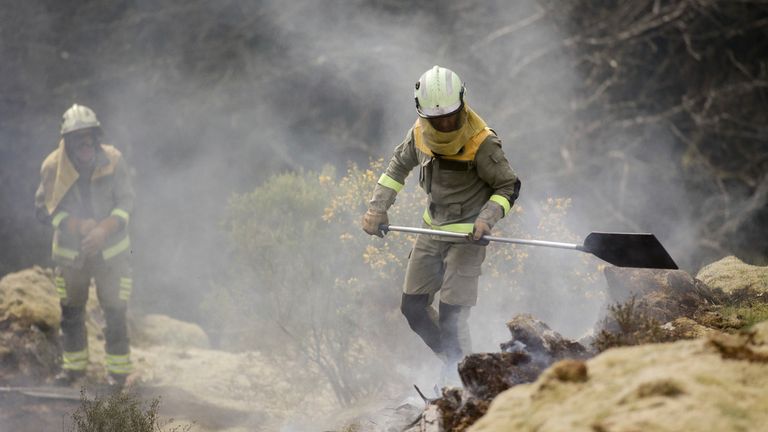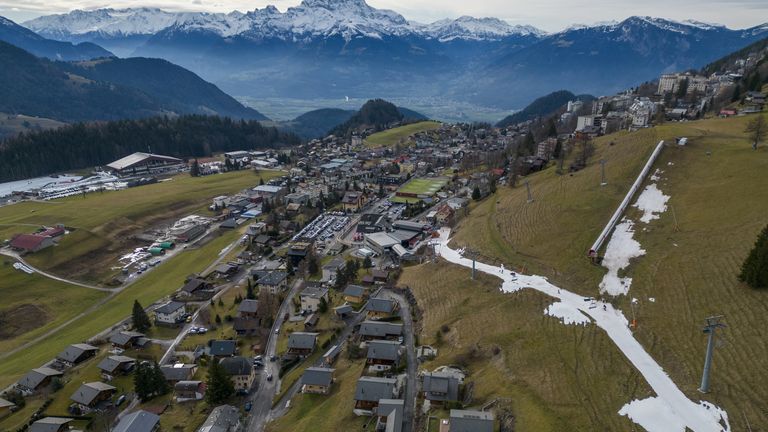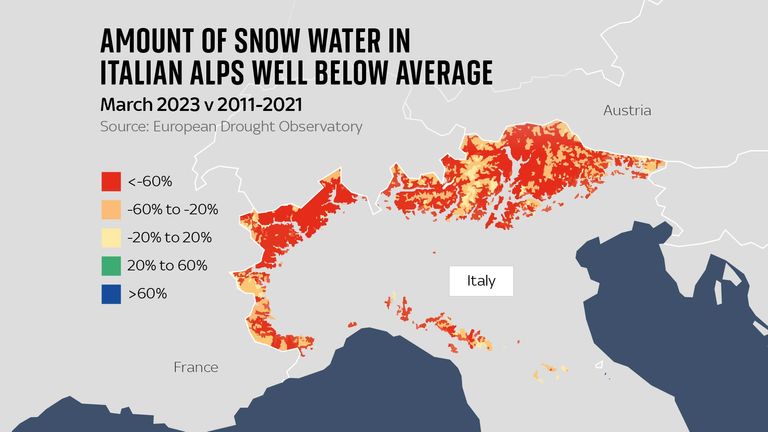Europe could see repeat of last summer's severe droughts, scientists warn
Scarce snow in the Alps, warm temperatures and a widespread lack of rain have scientists worried about a second summer of widespread drought.
Wednesday 5 April 2023 00:02, UK
Scientists are warning Europe could see a repeat of the severe droughts that impacted the continent last summer.
In a special snapshot report of drought in Europe in March, the European Drought Observatory (EDO) warned conditions in late winter were similar to those last year - when extreme drought affected areas all over the continent in the summer months.
Last summer saw dry weather shrivel rivers in Germany, fuel vicious wildfires in Spain, deplete Italian hydropower reservoirs and wither crops in France.
After a terrible snow season in the Alps this winter which saw resorts close and snow machines go into overdrive, the European Union's drought body has said there is now a "high risk" of water shortages this spring.
The dry weather was not confined just to the mountains but pervaded much of the continent this winter, with signs of drought already creeping into parts of France, Spain and northern Italy, according to the European Drought Observatory (EDO).
"Some parts of Europe haven't really fully recovered from last year's drought, and re-entering or continuing with such conditions can amplify the impacts and have a cascading effect," warned Andrea Toreti, a senior scientist at the EDO, who compiles the drought data.
"The worst fear for me is that we are going to experience another severe-to-extreme drought, such as the one of last year, or even worse, that would affect again most of Europe," he told Sky News.
The EDO's Combined Drought Indicator showed widespread warning conditions for drought in countries including the UK, Ireland and Switzerland.
Spring is forecast to be warmer than average over Europe, meaning "proper water use plans are required to deal with a season that currently has a high risk of being critical for water resources".
The UK government and water companies are under ongoing fire from opposition MPs and campaigners to clean up the country's filthy waterways, polluted by plastics, farming and chemicals, and plug widespread leaks.
Last week, France's President Emmanuel Macron launched a broad plan to save water resources.
Resources are growing increasingly scarce because of climate change, making farming more difficult, drying lakes and leaving some household taps running dry.
A wildfire that burned for several days in Spain last month was unusually long and early in the year.
Snow in the Alps 'far below historical average'
The amount of water frozen in the snowy Alps is now even lower than this time last year, the EDO said, meaning a "severe" drop in the water that will flow into nearby rivers when the snow melts.
In fact, the snow conditions this year are the worst since 2011 in Italy and since 1998 in Switzerland.
Scientists are worried that drought driven by the climate crisis is hitting harder and sooner than they had forecast.
Just a few years ago "we estimated that recurrent extreme drought, such as the one we have been observing last year, would have become a common occurrence around mid-century under the most pessimistic scenarios", said Mr Toreti.
"Now it seems that we are already in this space because there was [drought in] 2018 and then 2022 and now again this year, so it seems that to me it is happening sooner than we were expecting."
Read more climate news:
California lake reappears after 100 years and causes havoc
Dairy cows could be fed methane suppressants
Professor Daniela Schmidt from Bristol University, a global expert on Europe's changing climate, said ongoing water shortages in Europe show the problem is "much more widespread than even our assessments last year would have concluded".
Extreme years like last year or 2018 "give a taste of what future climate change might look like", she said.
"We have rivers which don't have enough water to transport goods. We have water shortages which are aggravated, of course, by faulty infrastructure," she said.
Click to subscribe to ClimateCast with Tom Heap wherever you get your podcasts
"Fish have to be removed from the river and brought to the next because there wasn't enough water."
An exceptionally wet March in the UK restored many reservoir levels, which ran extremely low last year, but water levels underground - which supply rivers - are still depleted, she said.
Watch the Daily Climate Show at 3.30pm Monday to Friday, and The Climate Show with Tom Heap on Saturday and Sunday at 3.30pm and 7.30pm.
All on Sky News, on the Sky News website and app, on YouTube and Twitter.
The show investigates how global warming is changing our landscape and highlights solutions to the crisis.

